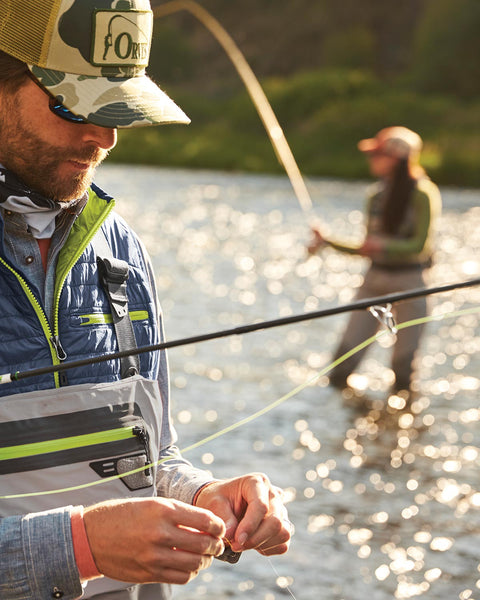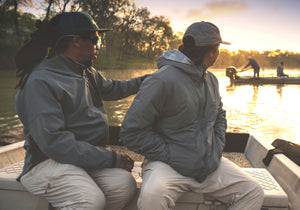Thinking of picking up a new hobby? Fly fishing is a fantastic place to start. Bask on the banks of the UK’s chalkstreams and rivers. Meet other fishing enthusiasts. And learn a unique skill that people have enjoyed for centuries.
If you’re new to fly fishing, everything you need to know is here, in our fly fishing for beginners guide. You’ll learn:
- What gear you need
- Fly fishing techniques
- Where to try fly fishing as a beginner.
What gear do I need for fly fishing?
There are a few essentials you need for fly fishing:
- Fly rod — a basic, lightweight fly rod like this 9-inch 5-weight fly rod is ideal for beginners
- Fly line, leader, and tippet — together, these create your fly fishing line. This super strong tippet and leader combo is a great choice.
- Fly reel — the rod above comes with a drag reel, but not all do. Drag reels help you control the fly line and help you play the fish, so it’s an essential for fly fishing
- Fly and hook —your fly is your bait. Make sure you have a sharp hook and an appetising fly for the fish you’re trying to catch.
- Protective clothing — you’ll need sturdy footwear, sun protection, and waterproof gear for fly fishing.
As you get more advanced, you’ll probably want to upgrade your kit. This might include investing in waders and a wading jacket, as well as investing in more sophisticated rods and reels.

Choosing your fly fishing kit
You can spend thousands on fly fishing gear. But you don’t need to spend a fortune while you’re learning the basics. This can save you money in the long run, while you figure out which accessories work best with your preferred fishing locations and style.
To make it easy for fly fishing newcomers to find appropriate gear, we’ve carefully selected the best fly fishing kit for beginners.
Fly fishing technique 101
Got your gear? Time to start practising your fly fishing technique. Here’s a step-by-step guide to your first time on the water.
1. Prepare your rod
Depending on which rod you’ve chosen, you may need to prepare it in different ways. Some come with the reel, fly line and tapered leader already attached — in which case, you can just attach your tippet and fly and move on.
2. Unspool your line
Now your rod is set up, unspool some of the line from the reel. Pull it through the last rod ring so you have 10-15 feet of line available. Then unspool a little more line and keep hold of it near the reel. This can be used to guide or control your line later.
3. False casting
False casting allows you to get used to the feel and weight of your fly line and rod. The technique involves sending the rod backwards and forwards — without letting the fly touch the water — and gradually releasing the line.
4. Cast your fly
When your line is ready, let it out and allow the fly to land on the water. It should pull the line taut. Keep your rod tip low to the surface.
5. Reel in your line
Use your hands to pull the line back towards you near the drag reel, just a couple of inches at a time. Don’t move too quickly — give the fish time to take a bite.
If you don’t get any takers, retrieve your line and recast.
How much false casting is necessary?
False casting is a good way for beginners to practise casting. It helps you understand the weight and establish a feel for the rod. But there’s some debate among fly fishing experts as to how much false casting is necessary.
Too much false casting can be tiring, and you’ll need energy for reeling in your trout later. It also increases the likelihood of problems like getting your fly caught in a branch, or spooking the fish.
So while false casting is an important skill to learn, it’s arguably more important to work on casting cleanly, without the need for excessive false casting. You can do this using a Practicaster. This tool allows you to practise casting safely away from the water, emulating the weight and feel of a real rod.
Where should I try fly fishing as a beginner?
Before you head out on the water, it’s a good idea to practise your casting technique in the garden or in a nearby field. This helps you:
- Build muscle memory
- Improve your technique
- Get used to your rod
- Practise casting without frightening the fish.
When you’re confident you can cast effectively, find a location such as a Stillwater near you.
Chalk streams aren’t the only option for fly fishing. When you’re more advanced, try tackling rivers, lakes, and even the sea.
Top fly fishing tips for beginners
Now you know where and how to fly fish, here are a few extra expert tips for beginners:
- Take your time — patience is key when fly fishing. The first thing to do is consider your location: what actual flies can you see? Is the current fast or slow? Is it safe to wade? Adapt your rod rigging based on the actual location, not what you expected to encounter.
- Begin out of the water — getting too close too quickly may spook fish lurking near the edge of the water. Fish the bank first. There’s plenty of time for wading and far-bank fishing.
- Check your fly line regularly — make a habit of checking your fly line to see if it’s knotted, or wrapped around twigs or rocks (or your feet). Also, keep your reel drag tight enough to prevent overspooling (but loose enough to prevent snapping).
- Keep your hooks sharp — if your hook gets stuck on the riverbed, or you’ve used it a few times already, check it’s still sharp. Have a supply of backup flies and a hook sharpener on hand.
- Prioritise your safety — understand the risks of sun damage, and of wading into cold water. Bring a hat, sunglasses, and warm, appropriate clothing for wading. It’s also a good idea to have a life vest on hand for emergencies.
More fly fishing guidance for beginners
At Orvis, we want to encourage more people to get out on the water. Our fly fishing school is the perfect introduction to fly fishing for beginners. Get one-to-one tuition, or involve the kids with our family fly fishing days.
Learn more about the Orvis fly fishing school.

